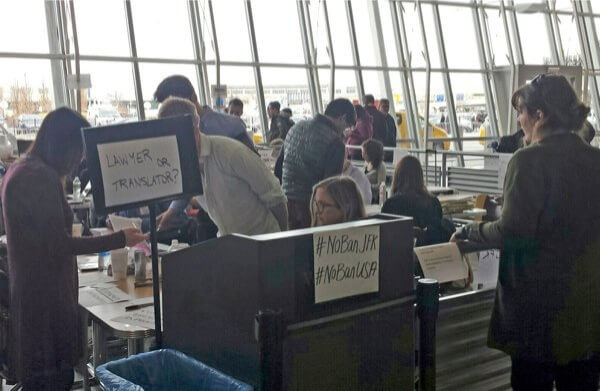By Bill Parry
The group of volunteer attorneys who camped out at Kennedy Airport assisting travelers from over 20 countries when President Donald Trump’s travel ban first went into effect in January were not expecting the same level of chaos when the new ban went into effect Thursday.
The U.S. Supreme Court agreed Monday to allow a limited version of the administration’s ban on travelers, prohibiting people from six predominantly Muslim countries from entering the United States, while agreeing to hear the case during the next session in October.
The attorneys, organized by the New York Immigration Coalition, were planning to have one or two lawyers at the airport to observe unless a full-blown presence becomes necessary, according to Camille Mackler, the group’s coordinator.
The court ruled that the ban “may not be enforced against foreign nationals who have a credible claim of a bona fide relationship with a person or entity in the United States,” which includes foreign nationals with family connections in the United States, students who have already been admitted to an American university or college or workers with job offers in the United States.
“By agreeing to hear Donald Trump’s discriminatory Muslim ban, the Supreme Court is ignoring the precedent set by the lower courts, which have found it to be plainly unconstitutional and wrong,” New York Immigration Coalition Executive Director Steven Choi said. “In so doing, it has further confused the issue by creating an entirely new category of ‘bona fide relationship,’ which agencies and affected individuals will struggle to make sense of.”
The travel ban had been on hold since March after two appeals courts blocked key parts of the order. The court also moved to lift the injunction blocking the travel ban, effectively allowing the policy to go into effect and imposing a 90-day pause in travel from citizens of Yemen, Syria, Sudan, Somalia, Libya and Iran into the United States.
“Today’s unanimous Supreme Court decision is a clear victory for our national security,” Trump said in a statement Monday. “It allows the travel suspension for the six terror-prone countries and the refugee suspension to become largely effective. As president, I cannot allow people into our country who want to do us harm.”
The court’s opinion was unsigned, meaning the breakdown of the justice’s vote is not clear, although three conservative — Justices Clarence Thomas, Samuel Alito and Neil Gorsuch — said they would have granted the Trump administration’s request to block lower court injunctions in its entirety while legal proceedings unfolded. The court will hear arguments on the travel ban case when it returns in the fall term, beginning the first Monday in October.
“While at least the Supreme Court will not allow the White House to block individuals with strong ties to the United States from entering the country until the justices have ruled on the travel ban case, any enforcement of this Muslim travel ban is highly concerning,” U.S. Rep. Joseph Crowley (D-Jackson Heights), the House Democratic Caucus chairman, said. “Our country was built on the idea that anyone seeking to better their life and contribute to our communities should be welcome in America. President Trump’s decision to block individuals from Muslim countries is in stark contrast to these founding values. This travel ban has hurt our global standing and serves as yet another reminder of the short-sighted foreign policy coming from the Trump administration.”
The Supreme Court’s decision was particularly disturbing for American Muslims, coming as it does on the Islamic end-of-Ramadan holiday of Eid ul-Fitr, according to CAIR National Executive Director Nihad Awad.
“(The) decision by the Supreme Court ignores the anti-Muslim bigotry that is at the heart of the travel ban executive orders and will inevitably embolden Islamophobes in the administration to expand efforts to target the Muslim community with unconstitutional and counterproductive policies,” Awad said. “It also ignores the almost-unanimous rejection of the Muslim ban by lower courts due to its religious intolerance and racial animus.”
Meanwhile, the Department of Homeland Security was expecting the travel ban to be handled more smoothly than in January.
“The granting of a partial stay of the circuit injunctions with regard to many aliens abroad restores to the Executive Branch’s crucial and long-held constitutional authority to defend our national borders,” DHS said in a statement. “The implementation of the executive order will be done professionally, with clear and sufficient public notice, particularly to potentially affected travelers, and in coordination with partners in the travel industry.”
Reach reporter Bill Parry by e-mail at bparr



































